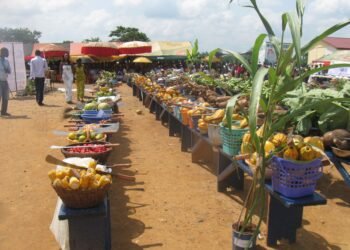The Science and Technology Policy Research Institute of the Council for Scientific and Industrial Research (CSIR – STEPRI) has embarked on a significant initiative to boost agricultural productivity through digital technologies.
The study, part of the ICT for Agriculture (ICT4Ag) project, aims to increase farmers’ uptake of digital innovations across Ghana. This initiative, named “Enhancing Farmers’ Uptake of Digital Technologies through Empirical Research, Innovation, and Policy Intervention” (EFUDTRIPI), seeks to understand the barriers preventing farmers from adopting digital technologies and to advocate for policies that facilitate their use.
The EFUDTRIPI project is a subset of the larger “Accelerating Inclusive Green Growth through Agri-based Digital Innovation in West Africa” (AgriDI) initiative. The study surveyed 1,040 farmers across nine of Ghana’s 16 regions, divided into northern, middle, and southern zones.
The aim was to assess the current state of digital technology adoption among small, medium, and large-scale farmers and identify the factors that influence their decisions.
Participants in the dissemination and validation workshop included representatives from government ministries, departments, and agencies, the private sector, ICT4AG companies, farmers and farmer organizations, research and academia, and the media. This diverse group underscores the collaborative effort required to drive digital innovation in agriculture.
Aligning with CSIR’s Vision
During the workshop’s opening, Professor Paul Bosu, Director-General of CSIR, emphasized that the EFUDTRIPI project aligns with the council’s overarching vision of using innovative science and technologies to promote socio-economic development.
CSIR focuses on seven key areas: food security and poverty reduction, climate change and green technology, material science and manufacturing, energy and petroleum, biomedical and public health, electronics and ICT, and science and people.
Professor Bosu highlighted that the current strategic plan of CSIR is geared towards developing, disseminating, and driving the adoption of products and services that improve efficiency and address electronic communication and engineering problems.
Despite many achievements, CSIR has faced challenges with the limited uptake of technologies. The findings from the EFUDTRIPI study are expected to bridge this gap, particularly in the agricultural sector, which is crucial for national development.
Encouraging Farmers to Embrace Technology
Professor Bosu urged farmers to adopt CSIR-developed technologies to enhance the agricultural sector. He extended gratitude to the project team led by Dr. Rose Omari, the International Centre of Insect Physiology and Ecology (ICIPE), and the Organisation of African, Caribbean, and Pacific States (OACPS) Research and Innovation Programme under the European Union for their support.
Mr. Kwamena Quaison, Director of STI, Ministry of Environment, Science, Technology, and Innovation, highlighted that policy initiatives are vital for fostering the uptake of digital technologies among farmers. He acknowledged the government’s success in improving agricultural output through programs like the Planting for Food and Jobs initiative, which provides farmers with essential inputs and resources.
Mr. Quaison also emphasized the critical role of private sector development in driving the adoption of digital technologies among farmers. Dr. Wilhemina Quaye, Director of CSIR-STEPRI, noted that the research institute aims to diversify its project portfolio by leveraging the multi-disciplinary expertise of researchers. This includes focusing on megatrends such as climate change, sustainable development, food safety, waste management, and renewable energy.
Dr. Quaye outlined several ongoing projects within STEPRI that cover broad areas of digitalization in agriculture, including food and nutrition, water-smart solutions, and resilience against climate change. She stressed the importance of partnering with relevant stakeholders to provide research evidence and knowledge-based information for policy formulation and implementation based on science, technology, and innovation.
Dr. Rose Omari, Principal Investigator for the project, emphasized that the workshop outcomes aim to enhance policymakers’ knowledge in adapting or formulating national policies. This will enable ICT4Ag companies to develop, adapt, and deliver quality, secure, and impactful digital solutions to farmers. Additionally, it will increase farmers’ usage of ICT and improve their productivity and operational efficiency.
The EFUDTRIPI project represents a critical step towards integrating digital technologies into agriculture, which is essential for enhancing productivity and ensuring sustainable development in Ghana. Through collaborative efforts and strategic policy interventions, the CSIR and its partners aim to create a more efficient and resilient agricultural sector.
READ ALSO: GSE Sees Bullish Surge as 5 Top Stocks Gain Momentum























